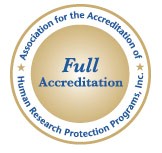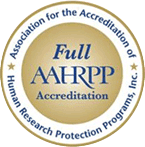Index
From the Director and IRB Education Outreach Manager
What Does It Mean to be AAHRPP Accredited?
Investigator Guide Changes – October 2019 Regulatory Newsletter
New Educational Tool – Data Security
Coming Soon! A Change in the Assignment of HawkIRB ID Numbers
From the Director and IRB Education Outreach Manager
By Kelly O’Berry and Michele Countryman
The University of Iowa has a long history of striving for excellence in its Human Research Protection Program (HRPP). As a result, the institution is a pioneer in the field of HRPP accreditation. The UI was the first academic institution to achieve accreditation from the Association for the Accreditation of Human Research Protection Programs (AAHRPP) in April 2003. Western IRB (WIRB) was also accredited in 2003, becoming the first commercial IRB to be accredited.
The UI HRPP is currently applying for reaccreditation. This newsletter will outline changes we made in the Investigator’s Guide as a result of this accreditation process and the role of the research community in the accreditation process. Yes, that means you, dear reader, have a role in the AAHRPP accreditation for the UI HRPP! The article about AAHRPP Accreditation will tell you more.
If you have questions or comments about the accreditation process, please contact one of us by email: kelly-oberry@uiowa.edu or michele-countryman@uiowa.edu or by phone: 319-335-6564.

What Does It Mean to be AAHRPP Accredited?
By Kelly O’Berry
AAHRPP (Association for the Accreditation of Human Research Protections Programs, Inc.) is an international organization that evaluates the effectiveness and preparedness of Human Research Protection Programs (HRPPs) to follow government regulation, organizational policies and procedures, and protect the rights of human subjects in research. AAHRPP is an independent, non-profit organization built on the principle that peer-driven education (i.e., learning from peers at other institutions) is the best model to ensure a strong, well-functioning, and ethically sound HRPP.
During the re-accreditation process, AAHRPP site visitors will review the UI HRPP policies and procedures. They will conduct interviews with IRB Chairs, IRB members, Human Subjects Office (HSO) staff and Key Personnel in the HRPP Committees and Units. They will also interview members of the UI research community, including select Principal Investigators and Study Coordinators. When AAHRPP sets the date for the site visit, they will indicate who they want to interview. If you are selected to be interviewed, we greatly appreciate your participation in the re-accreditation process.
AAHRPP guidelines include a set of three domains to help to create a solid structure in which the Human Subjects Office and the Institutional Review Board can follow federal regulations:
- Organization (about the HRPP as a whole)
- Institutional Review Board or Ethics Committee
- Researcher and Research Staff
The AAHRPP Accreditation Process
AAHRPP accreditation is a multi-step process in which the University’s HRPP provides documentation about the University’s policies, procedures, processes, and State of Iowa laws governing the conduct of human subjects research.
The goal of accreditation is to ensure that institutions have a strong HRPP, that is operating effectively. The Office of Human Research Protections (OHRP) and the Food and Drug administration (FDA) are less likely to select AAHRPP- accredited organization for audits. Additionally, AAHRPP-accredited institutions that are audited are less likely to have negative findings than those that are not accredited.
Step 1: The University of Iowa HRPP submits an accreditation application to AAHRPP. Included in the AAHRPP application are documents such as
- the “Investigator’s Guide to Human Subjects Research at the University of Iowa”
- parts of the University’s Operations Manual
- the entirety of the HawkIRB application
- the Contract Template used by the Division of Sponsored Programs
- copies of the Primary Reviewer checklists
- materials used in compliance monitoring
- information about the HSO’s efforts to educate University researchers, the IRB, and the HSO staff
- and much more!
The AAHRPP process ensures that the University documents existing practices and strengthens areas of weakness in the IRB review process; it should not create additional burden for investigators and research administration and staff.
Step 2: AAHRPP staff and a voluntary application reviewer from another research institution analyze the application and send feedback about how to enhance areas of the application and address any concerns about the University’s processes and procedures.
Step 3: The AAHRPP site visit involves interviewing University faculty and staff from research administration and University researchers who work with human subjects. Yes, that means YOU could be interviewed during the accreditation site visit this fall (the date has not yet been set). The AAHRPP site visitors identify the people they want to interview and then staff in the Human Subjects Office will coordinate the scheduling for the site visit.
Interviews can be conducted with individuals or in small groups. They range in length from 45 minutes to 1.5 hours. All interviews will take place in the Human Subjects Office (105 Hardin Library) or in the IRB meeting room (101 Hardin Library)
If you are interested in learning additional information about the three-step accreditation process, please visit the AAHRPP website.

Investigator Guide Changes – Oct 2019 Regulatory Newsletter
By Maegan Tyrrell
Updates to the Investigator’s Guide
As a result of our re-accreditation process, the Human Subjects Office (HSO) recently updated the UI IRB Standard Operating Procedures (SOP) and Researcher Guide (AKA the Investigator’s Guide). A summary of the changes and a tracked change version of the Investigator’s Guide are posted on the HSO website.
Some of the changes relate to the requirements for conducting research in compliance with the International Conference on Harmonization - Good Clinical Practice (ICH-GCP) guidelines. These policies apply to the small number of studies for which the sponsor does not accept UI template language about IRB oversight according to ICH-GCP guidelines.
We want to call your attention to some of the changes that reflect updated policies or clarification of existing policies:
Screening Prior to Enrollment - The IRB no longer requires a formal waiver of informed consent or waiver of documentation of consent for screening activities prior to subject enrollment (Section 5.C.iii & 11.A.ii). Subject verbal agreement to complete a screening questionnaire or interview will be sufficient.
UI Mass Email – ITS recently updated the process for submitting mass email requests (Section 11.A.ii.b). There is information about this on the ITS website and also on the Human Subjects Office website.
Record Retention Requirements – The IRB policy has not changed, but we updated Section II, Part 23, to better describe the records the Principal Investigator needs to maintain while the study is open and for a specified period of time after the study is closed.
In conjunction with the UI Investigator’s Guide updates, the HSO also updated the VA Researcher Guide. The web page includes a summary of the changes and a tracked change version.
New Educational Tool – Data Security
By Kelly O’Berry
We are pleased to announce the posting of a new Educational Tool, “Data Security: Storing & Transmitting Data for Human Subjects Research.” This guidance document explains the distinction between privacy and confidentiality protections and provides best practices for protecting subject privacy and implementing appropriate confidentiality protections for data collected for research purposes.
This Educational Tool also includes references to University of Iowa IT Security policy and core security standards for data storage on laptops, desktops and mobile devices. ITS has guidelines for storage depending on the level of sensitivity of the data – Public, University/Internal, Restricted and Critical. ITS also provides guidance about the use of certain tools for data collection and storage.
Additional information and guidance is available on the IT Security website. You may also request a consult by emailing research-computing@uiowa.edu.
The Human Subjects Office has several other educational tools posted on this page of the Human Subjects Office website. We welcome your suggestions of topics for other Educational Tools. Please send your ideas to the IRB Education & Outreach Program.
Coming Soon! A Change in the Assignment of HawkIRB ID Numbers
By Kelly O’Berry
We are pleased to announce that the way HawkIRB assigns study identification (ID) numbers will be changing soon. Currently the HawkIRB system generates study ID numbers when the researcher presses the submit button for a New Project form. The ID number is based on the year, the month and the order the study was submitted in that month (beginning with 700 for IRB-01, IRB-02 and IRB-03 projects). However, in the very near future, HawkIRB will assign study ID numbers when the researcher generates the draft form in their HawkIRB inbox.
That means every time someone creates a draft New Project or Human Subjects Research Determination (HSRD) form, HawkIRB will assign an ID number. The number will now be based on the month and year and order the draft form was created. We will no longer be able to tell the date of the submission by looking at the HawkIRB ID number.
This change in HawkIRB is part of an effort to streamline the review by other committees in the Human Research Protection Program. Some of those committees review the project BEFORE the application is submitted to the IRB and it will be helpful for them to have the HawkIRB ID number in advance. These efforts are intended to shorten the time from HawkIRB submission to approval by making sure all committees can begin their review at the time of submission.



